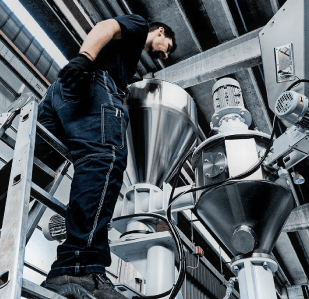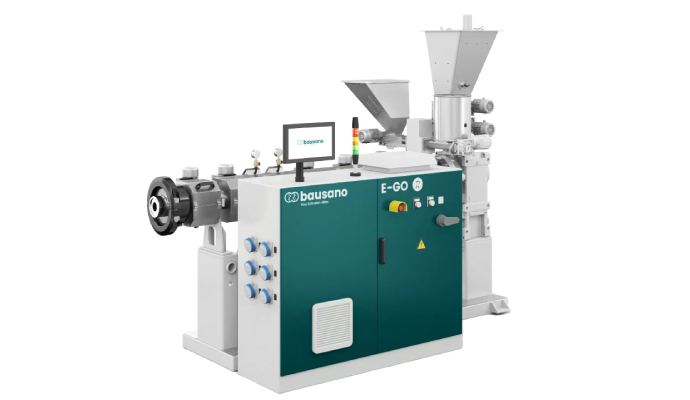Brief Summary
The plastics industry is experiencing continuous growth: valued at US$593 billion in 2021, it is estimated to exceed US$810 billion by 2030*. This increase is due to both the material's versatility – it is suitable for multiple applications – and its recyclability, which makes it a valid and environmentally friendly alternative that helps with rising costs and raw material shortages. In this regard, there is a growing need to re-introduce post-industrial or post-consumer waste back into the production cycle, viewing it as a valuable resource. Bausano has more than 75 years of consolidated knowledge and expertise, allowing it to specialise in finding ad-hoc solutions aimed at converting regenerated material into quality products, as well as developing dedicated extrusion lines for the recycling of the main polyolefins (HDPE, LDPE and PP) or for the regranulation of rigid or flexible PVC.
Challenges in plastics recovery and how metal coating technologies can help
The first challenge in re-processing waste polymers is their degradation, due to the stress suffered by the material during initial processing from virgin material. Specifically, high temperatures and shear forces strongly affect the polymer chain and change its properties. The second challenge is the risk of incurring wear and damage to the metal components of the plants processing the scrap. In fact, post-consumer and/or post-industrial thermoplastic material is typically characterised by the presence of impurities, such as glass fibres or metal. The cheapest raw materials are often the most polluted and mixed with other materials, thus the most complex to process. This problem can be addressed, in the first instance, by integrating the best filtration technology into the extrusion plant to purify the plastic from extraneous residues.
Bausano designs and customises technologically advanced solutions by intervening on individual components. The innovative metal coating technologies can be applied not only to the screws but also to the collector, granular head and blades of the cutting system. These metal coating technologies are made entirely in-house and designed according to the rheological behaviour of polymers in order to ensure their processability and maximum performance in the extrusion process.
Special metal coating technologies
There are two finishes that provide excellent wear and corrosion resistance: innovative metallic and ceramic-based glass coatings. Due to its chemical properties, the metallic coating promotes melt flow during processing, while the coating with ceramic properties has a low coefficient of friction and is able to cope with aggressive environmental conditions. It is, in fact, ideal for extrusion and moulding processes of polymers containing chloride and fluoride. Finally, these metal finishing technologies, which are applied to screws, extrusion heads, granulation medals and manifolds ensure long-term plant operational continuity and low maintenance costs.
Metal coating technologies and specially designed components
When it comes to designing lines for re-processing scrap material, one of the pluses offered by Bausano is the careful study of several variables that affect the processing of raw materials: cylinder temperature, screw rotation speed and pressure. Firstly, in order to eliminate stagnation zones that can cause material degradation, Bausano designs screws by taking into account the diameter, length, pitch, channel depth and compression ratio. Secondly, screws should not have special mixing zones (notching zones), as this would compromise the quality of the extrudate. Bausano also provides a degassing system: an innovative filter changer with mesh filters with a special geometry to prevent stagnation and with an automatic breaker plate ejection system. Finally, it is vitally important to carefully control the temperature at which gelation is achieved, which should be in the range of 150°C to 170°C, depending on the formulation.
E-go r, revolutionising polyolefin recycling with metal coating technologies
Bausano has developed the next-generation E-GO R extruder, designed for recycling and repelletising post-industrial and post-consumer waste, both highly humid and heavy films, with low water content. These include: HDPE, such as containers for milk, engine oil, shampoo, conditioner, soap, detergent and bleach; LDPE i.e., transparent films, shopping bags and squeezable bottles; PP, such as lunch boxes, yoghurt pots, syrup, medicine bottles and caps. After the washing and crushing stage, the contaminated material is transported into the extruder by a force-feeding system specifically designed according to the type of use. In the process, moisture and volatiles are removed by means of a single- or dual-zone degassing system. The extruded mass is then filtered and directed to the water or immersion cutting system for perfect uniformity of the obtained granule surface.
In this context in which the regeneration of plastics plays an increasingly central role, making use of specifically designed solutions becomes an essential prerequisite in order to reap maximum benefits. At Bausano, in addition to customising extrusion lines according to the application and the customer's needs, we also aim to ensure the highest technical quality and performance at every single stage of the process, thanks to our in-house design and development department. In fact, we meticulously select the best materials and work on the components that require the most attention with innovative metal coating technologies and treatments that make our extruders even more durable and high-performance. This is tangible added value that customers can experience every time they rely on our lines for their plastics processing projects.
*Source: statista



.jpeg)



